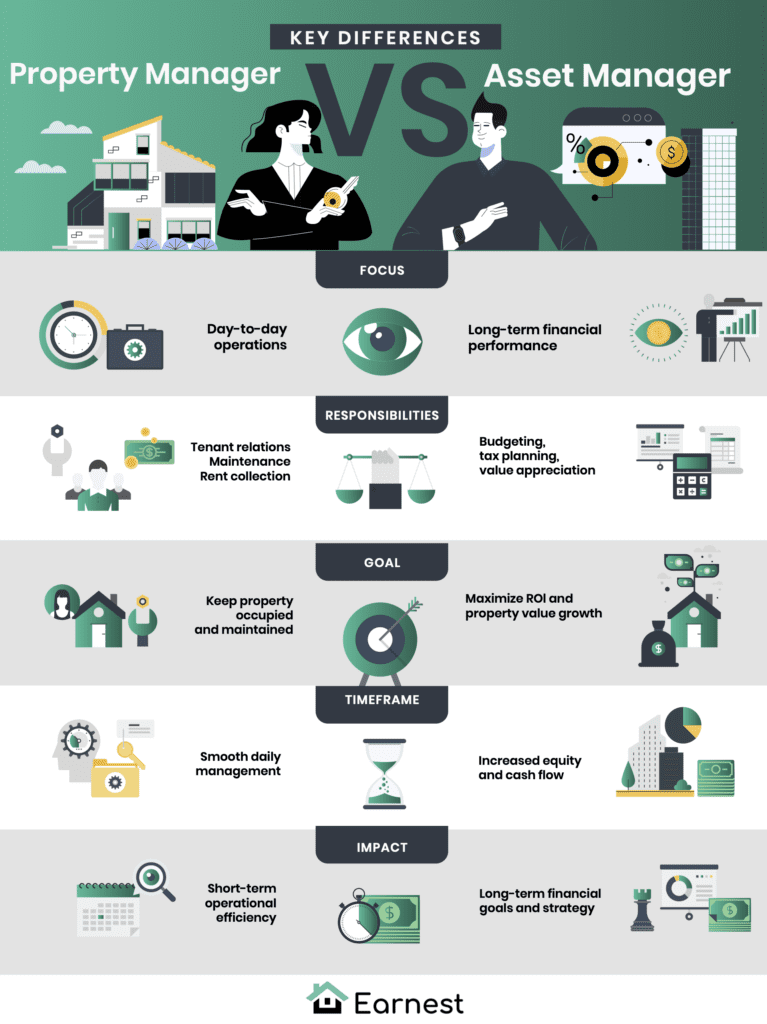
When it comes to real estate investments, understanding the difference between property management and asset management is crucial. Both play vital roles, but they serve distinct functions with different impacts on your bottom line. Choosing the right service—or a combination of both—can significantly influence your cash flow, property value, and long-term returns.
What Does a Property Manager Do?
A property manager handles the day-to-day operations of your real estate investment. Their focus is on maintaining the property, ensuring it is occupied with reliable tenants, and dealing with routine tasks. Here’s what they cover:
- Rent Collection: Ensures rent is collected in full and on time, handling late payments and enforcing lease terms.
- Tenant Relations: Manages communication with tenants, addresses complaints, and resolves minor disputes.
- Marketing Vacancies: Lists and advertises vacant units, aiming to minimize downtime between tenants.
- Tenant Screening: Conducts background checks, verifies income, and ensures qualified tenants occupy your units.
- Lease Signing: Prepares and executes lease agreements, ensuring legal compliance.
- Maintenance and Repairs: Coordinates routine maintenance and emergency repairs to keep the property in good condition.
- Move-in/Move-out: Handles inspections, security deposits, and turnover procedures.
- Evictions: Manages the legal process for tenant removals when necessary.
- Accounting: Provides monthly financial statements, tracks expenses, and manages operating income.
- Dispute Resolution: Acts as the first line of defense for resolving tenant conflicts.
What Does an Asset Manager Do?
An asset manager takes a strategic, big-picture approach to your real estate portfolio. While they typically oversee property managers, their primary focus is on maximizing the financial performance and long-term value of your investment. Their responsibilities include:
- Financial Performance & Growth Goals: Establishes a baseline of financial performance with clear growth targets.
- Capital Investment Planning: Strategically plans large-scale property improvements, such as roof replacements, plumbing upgrades, or energy efficiency enhancements.
- Tax Strategy: Identifies opportunities to reduce tax liability through depreciation, interest deductions, and other tax advantages.
- Budgeting: Creates a detailed property management budget to control costs and maximize profits.
- Property Value Appreciation: Tracks market trends and property value changes to capitalize on appreciation opportunities.
- Long-Term Management Plan: Aligns property management decisions with your long-term investment objectives, such as eventual sale or portfolio expansion.
Key Differences: Property Manager vs. Asset Manager
| Aspect | Property Manager | Asset Manager |
| Focus | Day-to-day operations | Long-term financial performance |
| Responsibilities | Tenant relations, maintenance, rent collection | Budgeting, tax planning, value appreciation |
| Goal | Keep property occupied and maintained | Maximize ROI and property value growth |
| Timeframe | Short-term operational efficiency | Long-term financial goals and strategy |
| Impact | Smooth daily management | Increased equity and cash flow |
An Example: Why Foreign Investors Need Both
If you’re a foreign investor purchasing a multi-family building in the U.S., you’ll likely need both a property manager and an asset manager to successfully oversee and grow your investment.
For example, a European investor who buys a 20-unit apartment complex may hire a property manager to handle tenant relations, rent collection, and maintenance. However, without physically being in the U.S., they may struggle to maximize the building’s financial potential.
By also bringing in an asset manager, they gain a partner who:
- Optimizes tax strategies by leveraging U.S. depreciation laws and interest deductions.
- Plans capital improvements that increase the building’s value and attract higher-paying tenants.
- Tracks market trends and advises on refinancing or resale opportunities.
- Provides detailed financial reporting and growth forecasts, helping the investor make data-driven decisions from abroad.
Why It Matters for Real Estate Investors
Whether you’re a local or international investor, the difference between property management and asset management isn’t just about operations versus strategy—it’s about protecting and growing your wealth.
For hands-off investors, combining both services offers peace of mind. Your property is in capable hands while you benefit from expert guidance on how to maximize returns and reduce liabilities.
Final Takeaway
For real estate investors, having both a property manager and an asset manager offers a powerful combination. The property manager ensures the building runs smoothly, while the asset manager strategically grows your wealth.
